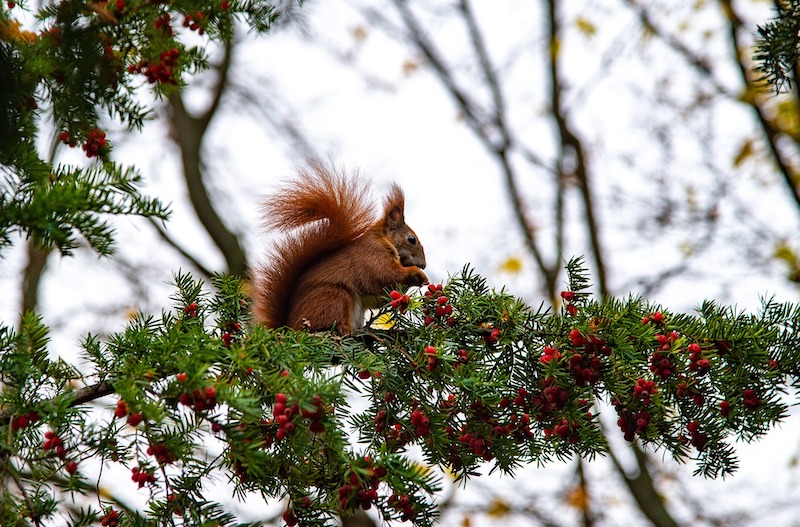Yews are well known for their toxic properties. Both fresh and dried yews parts contain highly toxic alkaloids known as taxines. All parts of the yew plant are toxic except the fleshy part of the aril (the fruit of the yew that looks like a berry) that surrounds the seed. There is no effective treatment for yew poisoning and it can be fatal. In some situations, sudden death may be the only observed sign. Yews are toxic to humans and most domesticated animals. The toxins are most concentrated in foliage during the winter months, but deer are able to munch on these plants with no ill effects.

Are Yews Poisonous to Children?
Yews are poisonous to children. Because of the nature of yew poisoning, where symptoms can appear suddenly and in a very severe manner within a few hours of consumption, it can be tough to identify and address yew poisoning. The red berries may appear particularly attractive to young children, so it may be best to avoid planting or decorating with yews where children may spot the berries. It is safe to touch the plant with no ill effects.
Are Yews Poisonous to Dogs?
Yews are poisonous for dogs. Because the branches and foliage of yews remain toxic until they are fully decomposed, it is important to keep trimmings away from pets. A dog is unlikely to consume or be drawn to yews because the volatile oil in the plant has an unpleasant taste. However, even a small amount of yew consumption or simply munching on leaves can have serious effects. Yew poisoning can appear as tremors, seizures, drooling, vomiting, difficulty breathing, dilated pupils, collapse, and coma, among other serious symptoms.
Are Yews Poisonous to Cats?
Yews are poisonous to cats. While the yew contains volatile oils that make the yew taste unappealing to cats, simply chewing on the foliage without consuming whole pieces can cause poisoning. Symptoms of yew poisoning in cats include but are not limited to tremors or seizures, drooling, vomiting, weakness, breathing difficulties, unusual behavior, collapse or coma, and changes in blood pressure and heart rate.
Are Yews Poisonous to Other Animals?
Yews are poisonous to most domesticated animals. This includes cattle, horses, sheep, llamas, and birds. Despite its toxicity, deer browse on yews and often favor it in landscapes. Cattle and horses have been killed by fewer than 16 ounces of yew leaves.

Symptoms Of Yew Poisoning
Always check with your doctor or veterinarian for guidance if you suspect yew poisoning. Symptoms may appear suddenly several hours after consumption, so act promptly even if the exposure occurred much earlier in the day.
Here are some common symptoms to look out for:
- vomiting
- diarrhea
- incoordination
- breathing difficulties
- nervousness
- convulsions
- death
Preventing Yew Poisoning
Because yews are so toxic, it is important to maintain separation between these plants and animals that may be tempted to consume the yews. A physical border like a fence or burlap wrapped around the yew in winter can keep domestic animals away from the plant. Yews should never be used as hedges around animal enclosures. It is also important to keep trimmings away from animals, as parts of the yew remain toxic until fully composted. Where separation cannot be guaranteed or a certain pet has a tendency to chew on plants, it is best to choose a less toxic option than a yew.
Pet Poison Helpline
If something were to happen to your furry friend, and you suspect that they are suffering from yew poisoning, there is a poison control hotline to call for 24/7 vet advice. It is called the Pet Poison Hotline, and their phone number is (855) 764-7661.
Sources:
"Toxicity of Yew Wood and Roots." PennState Extension. extension.psu.edu
"Yew." Colorado State University - Guide to Poisonous Plants. poisonousplants.cvmbs.colostate.edu
 |
Author Angela Ryczkowski - Published 4-10-2023 |
